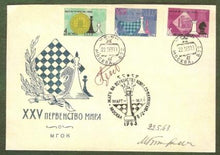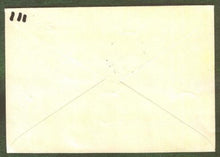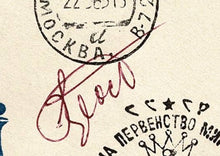Author: Tigran Vartanovich Petrosian (1929-1984) and Mikhail Moiseyevich Botvinnik signed
Year: 1963
Publisher: USSR Chess Federation
Place: Moscow
Description:
One sheet cover with cancelled stamp and decorative chess board in black on beige paper. Commemorative cancel to stamp. Signed by both players, Tigran Petrosian in red ink and Mikhail Botvinnik in blue ink, dated by Botvinnik 22 May 1963. Stamped in Moscow.
Event covers are decorated, stamped and canceled commemorative envelopes. They are created to celebrate an event or note an anniversary. The design (called a "cachet") is generally placed on the left side of the envelope (although there are also "all over" cachets). It explains what is being commemorated on what date, and some times includes an illustration page. Ideally, the stamps used relate to the celebration. Cancels are either obtained in the city of the event. If a special cancellation (one with a design) has been created for the event, you can generally only receive that cancel from the local post office.
Tigran Petrosian was a Soviet Armenian grandmaster, and World Chess Champion from 1963 to 1969. He was nicknamed "Iron Tigran" due to his almost impenetrable defensive playing style, which emphasized safety above all else. Petrosian was a Candidate for the World Championship on eight occasions (1953, 1956, 1959, 1962, 1971, 1974, 1977 and 1980). He won the world championship in 1963 (against Mikhail Botvinnik), successfully defended it in 1966 (against Boris Spassky), and lost it in 1969 (to Spassky). Thus he was the defending World Champion or a World Championship candidate in ten consecutive three-year cycles. He won the Soviet Championship four times (1959, 1961, 1969, and 1975). Petrosian was recognized as the hardest player to beat in the history of chess by the authors of a 2004 book
Mikhail Moiseyevich Botvinnik was a Soviet and Russian International Grandmaster and three-time World Chess Champion. Working as an electrical engineer and computer scientist at the same time, he was one of the very few famous chess players who achieved distinction in another career while playing top-class competitive chess. He was also a pioneer of computer chess. Botvinnik was the first world-class player to develop within the Soviet Union (Alekhine was a top player before the Russian Revolution), putting him under political pressure but also giving him considerable influence within Soviet chess. From time to time he was accused of using that influence to his own advantage, but the evidence is unclear and some suggest he resisted attempts by Soviet officials to intimidate some of his rivals. Botvinnik also played a major role in the organization of chess, making a significant contribution to the design of the World Chess Championship system after World War II and becoming a leading member of the coaching system that enabled the Soviet Union to dominate top-class chess during that time. His famous pupils include World Champions Anatoly Karpov, Garry Kasparov and Vladimir Kramnik.
At the World Chess Championship 1963 Tigran Petrosian narrowly qualified to challenge Mikhail Botvinnik for the World Chess Championship, and then won the match to become the ninth World Chess Champion. The cycle is particularly remembered for the controversy surrounding the Candidates' Tournament at Curaçao in 1962, which resulted in FIDE changing the format of the Candidates Tournament to a series of knockout matches.
Condition:
Some edge wear with the top opening being slit in very good condition.
SOLD 2024







